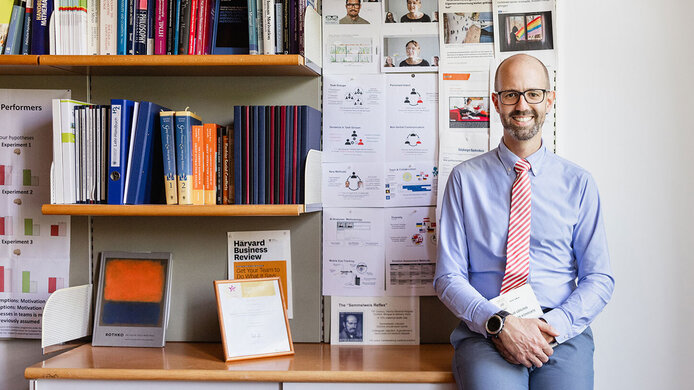Roadblocks to teamwork

Mr. Thürmer, the catchphrase for your research is working in groups. What answers are you looking to find with your START project?
J. Lukas Thürmer: I am driven by the question of how teams achieve their goals. So far, we have looked at the achievement of goals by individuals or entire groups. Now we will be investigating what happens when individual group members challenge the dynamics of the group. So far, we have not been able to examine these factors comprehensively because we lacked the technical and statistical means. Now, for the first time, it will be possible to precisely model these dynamics within a group.
What situations are of interest to you specifically?
Thürmer: In my research, I study what happens when a group member exhibits deviant behavior that is relevant to the group’s performance. We call this “task deviance”. I chose three prototypical situations for my START project. The first is when a group member delivers an unexpected performance, such as holding a weight for a very long time. Secondly, I am interested in group decision-making and how people who inject controversial information or preferences impact the process. Third, I plan to examine collaborative problem solving. Here, deviant individuals can be helpful because they bring criticism to the suboptimal approach currently being used to solve the problem.
Why are these tasks in particular relevant to the study of groups?
Thürmer: In each of these three situations, a fundamental goal that we pursue when we form groups is under threat. Individuals who are deviant in their performance threaten the collaborative effort. Those who deviate from a group decision threaten the group members’ shared worldview. And those who express criticism present an impediment to generating a positive group feeling, in other words, a positive view of one’s group. All of this means that even helpful contributions, information or ideas can go unheeded. My hypothesis is that a group’s reaction to deviant behavior depends on how the behavior’s intention toward the group is perceived. Basically, does the person in question want to help the group or not?
I would like to use my research to see when people stop being socially mindful.
How will you test your hypothesis?
Thürmer: Interactive experiments form the core of my project. In our experiments we will give test subjects performance, decision-making and problem-solving tasks, which they work on as a group. We will film and analyze their behavior using artificial intelligence and special software. This method allows us to collect detailed data, for example on facial expressions and verbal exchanges. In addition, the test subjects will be wearing eye-tracking glasses that record their eye movements. This gives us insights into nonverbal communication and allows us to see which areas of another person’s face are of interest to them. Merging these data sets will allow us to analyze whether variables change when a positive or negative intention is attributed to the deviant person. Moreover, the tasks we give them enable us to measure the impact on the group’s performance.
What is the significance of the START award for your research activities?
Thürmer: The project would not be possible without the START award, because no other funding source would allow us to pursue such a comprehensive and systematic approach. In addition, the experiments will generate a large treasure trove of data, which we can also use to take our research further, beyond our original hypothesis. Another exciting point is that we can conduct these experiments in Austria.
Only recently, a study was published examining 31 countries to see how socially mindful people were of others. Austria came in second, which is an interesting starting point, because I would like to use my research to see when people stop being socially mindful. If we see exclusionary effects here in Austria, they could have an even greater impact in other countries that ranked lower in the study.
Are there role models who have shaped your work?
Thürmer: Yes, too many to name here. But one stands out, the German-American psychologist Kurt Lewin. On the one hand, he is a role model for me in terms of content, since his work formed the starting point on group research. But I also admire him on a personal level because he created a highly productive environment in his lab that was conducive to discussion and at the same time very inclusive. He managed to create acceptance for deviant individuals, but unfortunately he did not publish anything on how to accomplish this.
J. Lukas Thürmer completed his PhD in psychology at the University of Konstanz and New York University in 2013. After positions in Pittsburgh and Göttingen as well as several international research stays, he has now been leading a group in the field of “Political and Intercultural Psychology” at the University of Salzburg. In the course of his research, Mr. Thürmer has received several grants, including the prestigious ERC Marie Skłodowska-Curie Global Fellowship from the European Commission, in which he laid the foundation for his START project.
About the project
The project “Deviance in Task Groups” focuses on the question of why groups often fail to benefit from deviant performance, information and criticism. The investigation will center on the hypothesis that deviant contributions are only accepted by individuals who show a clear intention to act for the good of the group. In the study, subjects will be presented with tasks and group dynamics will be recorded from multiple perspectives. The data will be analyzed using artificial intelligence and is aimed at providing insight into the subtleties of teamwork.
The FWF START Award
The START program of the Austrian Science Fund (FWF) is aimed at outstanding young researchers, giving them the opportunity to plan their research in the long term and with a high degree of financial securityIt is endowed with up to €1.2 million and is one of Austria’s most prestigious and most highly endowed awards alongside the FWF Wittgenstein Award.





